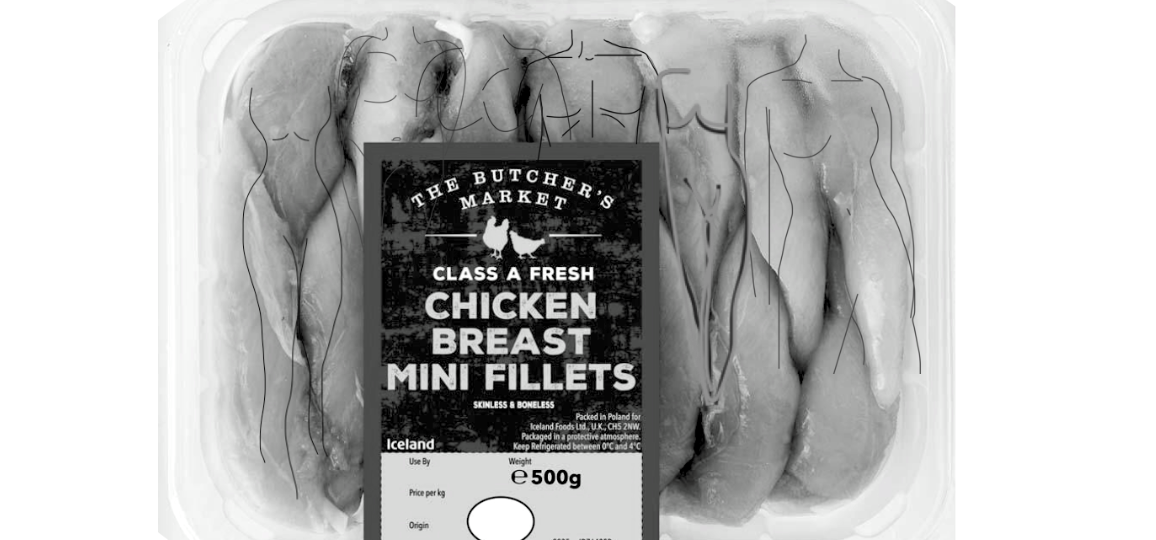[Note: this is a relatively long article. For literary purposes, I decided to stick to a long build-up and explanation, instead of cutting it short. For that reason, I would truly appreciate it if the reader took the time and patience to read the whole thing. Hope you enjoy]
Although many moons have shined since the last time I picked out a tray of meat in a supermarket, the thought process that accompanies such mundane action is still nicely shelved in the back of my mind. The pinkish shade of raw flesh, the size of the piece and the shape of the cut, the smell of fresh blood and spotless clean film on top– all the characteristics of a good product.
Throughout my childhood, such a careful presentation of a piece of a dead animal just seemed to me to be a reiteration of the well-known health mantra, “you are what you eat”, of the basic biological equation of food products affecting our mental and physical health. It was only recently, when helping my mum pick out chicken for a meal she was cooking for some friends, that I found myself strolling down aisles of refrigerated poultry and, for the first time in years, looking carefully at the contents inside.
I have known for some time now, that the aesthetic of meat trays in supermarkets is a dual advertisement design to attract costumers to their ‘tastiness’ while hiding away the unswallowable fact that the rosy meat was, not that long ago, a living being; what hadn’t clicked until that day, however, was the extent to which those trays also reflect a much deeper aspect of our social reality.
Our Packaged Meat Syndrome.
If you decided to stop and Google the term, you probably realized that only articles on bacteria found in processed meat or food poisoning in restaurants come up. The reason being that it’s not a scientific term; I made it up. Just bear with my ramblings for a second. When you’re buying, let’s say chicken, you’re, based on the aspect of the meat, making a judgment on its quality. You haven’t tried that chicken: you may have tried that brand, or a similar-looking piece, but you have not tasted the one you’re about to purchase. Yet, you make that judgment, and you feel like your verdict is based on a warranted reason. When you’re looking at the chicken, you’re also aware to some degree that it was killed for human consumption. You allow, however, for this awareness to be shifted by the innocent presentation of the product: you engage in a process of disassociation from the chicken by assuming that the shiny label telling you its origin and date of packaging provide you with its whole background story, by equating slaughterhouses to a simple life-death dichotomy instead of internalizing the fact that your decision to buy that chicken makes you a direct actor in its death. In brief, during that moment of pause in the meat aisle, everything about the chicken is reduced to what it looks like.
And that is exactly how we treat each other.
I’m not simply referring to the huge importance we place on looks: I’m referring to the apparent unspoken conviction that looks can tell us just enough about other people for us to form an impression of them and treat them accordingly. When we see someone, we employ their looks to place them in a category tinted with preconceived notions of what their character will be like: a ‘sports bro’, over-confident and ever slightly aggressive; the ‘dumb blonde’, shallow and dramatic; the ‘asexual nerd’, shy and awkward. I could go on listing inaccurate stereotypes, and this is precisely where you would stop me– those are just stereotypes; we all know what they are. And that is true: in the era of the largest progress towards equality, racial and gender stereotypes are being fought against harder than ever, and the general awareness that assuming, for instance, that a black woman will be a certain way is known to be unacceptable (even if people still do it). Yet, this very necessary social battle against general stereotypes appears to have no impact on the hurtful and unsustained judgments we still make every day.
We decide if people are good enough. We’ll look at their clothes, at their body language, at their physique, and we allow our treatment of them to be influenced by our verdict– who we invite out for drinks, who we are keen on stopping to talk to on the street, in sum, who we make an effort to interact with more deeply. We presume that we’re simply interacting with those we like the most but, the fact of the matter is, that we rarely get to properly know those whose outer look we don’t directly approve of; when we do, we tend to be surprised, using phrases such as “aw, she’s actually a sweet girl, you know”, and forgetting the negative comments we may have made about them in the past. In the same way that we assume that one good chicken breast from one brand means that all chicken breasts from that brand will be good, we subconsciously presume that genuinely liking or disliking a person that aesthetically appears to fit into a group means that our opinion of them will apply to every single other person who does as well.
Now, one could argue that the similarity is not that important, that picking, let’s say, a brand of chicken, makes perfect sense given that past positive experience helps ensure (or hope to ensure) future positive ones. One could say that the similarity is not even that similar (apologies for the redundancy), for meat is a product to be consumed and human beings are, merely, human beings.
Are we?
Is it a dichotomy, product versus person, person versus product? In the modern capitalist society (excuse me for bluntly bringing that up), have we escaped commodification?
Over the past few years, I’ve increasingly grown to believe that, instead of keeping ourselves safe from the process, we actively engage with it. It is the above described first glance at a person that makes us decide whether we want to purchase them, have them in our lives.
We are all aware of it.
Just like the meat packed in shiny plastic, we build an image that will reflect the tastiness of our personality without quite showing the harder bits of our story. We all buy into it; we assume we know someone’s character after having met them twice because we take the things they say about themselves, life, and others at face value. We are content with not having to actively acknowledge someone’s background– we like the gossip, but rarely the emotional effort of making a change to our behavior to make someone feel better. Just like we may pick a vegetarian option once in a while at a restaurant but can’t commit to not buying bacon for breakfast, we may sit with someone and talk about their problems for hours but, after a few days, any effort we were making will evaporate.
We rate each other.
In the same way that I would recommend oat milk to a friend, I would tell them that someone I barely knew was lovely if I thought so; but I would also tell them that someone was rude, even if I had met them for the same amount of time. We are so used to being consumers, that we’ve grown to have a subconscious sense of entitlement to make a judgment over what’s presented to us– and just like all entitled costumers do, we feel comfortable giving out negative feedback without reason.
Excuse my language, but we love bitching about others.
Please don’t tell me it’s a residue survival instinct, please let us be responsible enough for once to admit that we don’t need to do it: as naive as it sounds, we could choose to treat each other with kindness. We don’t.
If people are products, the social sphere is the market, both on the local and global level. Through our attitudes, through our behavior, we communicate to politicians what type of character we want: from the extreme of Donald Trump’s completely unacceptable comments, to AOC’s sassiness, our way of treating others is replicated, in a political scale, by those in power. The reason? We pay for it with our votes. The consequence? Our ways of acting become even more exaggerated, because they’re being paid for by the encouragement of our representatives. The list of more and more specific examples feels neverending: canceling people just like we throw out meat leftovers when we feel too full; sticking to social groups, including political parties because, like with fancy sausage packages, we like their image… Under capitalism, society and politics are mutually feeding cycles; under capitalism, we all take an active part in them.
Maybe that’s what I realized at that supermarket a few weeks ago. You, we, are not only chemically what we eat: we are also those slices of meat covered in shiny plastic, waiting to be consumed by others.
[Art by Jade Fagersten]




